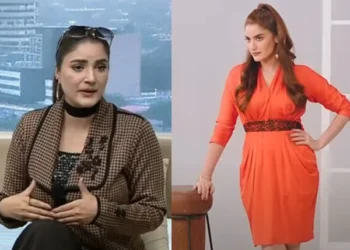Introduction — A Comment That Sparked an Online Storm
A light-hearted remark made by veteran Pakistani actress Parveen Akbar about fellow star Sanam Saeed has set social media buzzing with heated debates. During a recent television interview, Parveen Akbar praised Sanam’s acting talent but also referred to her as a “tomboy” — saying she looks “less like a girl and more like a boy.” While some saw it as an innocent compliment about Sanam’s unconventional style, others criticized it as body-shaming and perpetuating gender stereotypes.
The Interview — Praise with a Side Remark
Parveen Akbar, a respected figure in the Pakistani drama industry with decades of experience, appeared on a morning TV show where she discussed the talent of the new generation of actors.
When the conversation turned to Sanam Saeed, the acclaimed star of hits like Zindagi Gulzar Hai and Cake, Parveen lauded her acting skills, describing her as “a very talented actress whose performances are always strong and impactful.”
However, it was her next statement that ignited controversy:
“To me, she looks less like a girl and more like a boy — a tomboy.”
Although Parveen delivered the comment with a smile, intending it as a light observation, the clip quickly went viral on platforms like Instagram, X (formerly Twitter), and Facebook, triggering a wave of mixed reactions.
Who is Sanam Saeed? — Breaking Stereotypes On and Off Screen
Sanam Saeed is one of Pakistan’s most celebrated contemporary actresses, known for portraying bold, independent, and layered female characters. Her career spans television, film, and theatre, and she has consistently been praised for avoiding stereotypical “glamour-only” roles in favor of more challenging narratives.
Her breakout role as Kashaf Murtaza in Zindagi Gulzar Hai earned her critical acclaim for portraying a strong-willed, academically ambitious woman from a modest background. Sanam’s real-life persona mirrors this independence — she often opts for minimalist fashion, avoids heavy makeup in public appearances, and has spoken openly about rejecting societal pressures to conform to traditional feminine norms.
This unconventional style may be what Parveen Akbar was alluding to when she used the term “tomboy.”
What Does ‘Tomboy’ Mean? — Cultural Context Matters
The term “tomboy” typically describes a girl or woman who enjoys activities and clothing styles traditionally associated with boys — such as sports, casual wear, or adventurous hobbies. In many cultures, it is used affectionately to denote spiritedness and individuality.
However, in South Asian societies where gender norms remain deeply ingrained, the term can sometimes be perceived as implying a lack of femininity — and therefore be taken as a critique rather than a compliment.
This cultural nuance explains why the same word can spark laughter in one audience but offense in another.
Social Media Reactions — Praise, Criticism, and Defenses
Following the viral clip, Pakistani social media users quickly split into two camps:
Criticism — “Unnecessary and Outdated”
- One user wrote:
“Such remarks do not befit senior actresses. It’s disappointing to see experienced artists casually comment on someone’s looks like this.” - Another said:
“First Atiqa Odho, now Parveen Akbar. Why do senior women in the industry body-shame others on live television?” - A feminist activist tweeted:
“This promotes gender stereotypes. Women are often the harshest critics of women who dare to be different.”
For these critics, the issue was not just about Sanam Saeed, but about the broader culture of policing women’s appearances and behavior.
Defenses — “It Was a Compliment”
- A fan commented:
“Parveen Akbar meant it as praise for Sanam’s unique style and acting versatility. People are overreacting.” - Another wrote:
“Tomboy is not an insult. It means a woman who is sporty, confident, and doesn’t conform to traditional fashion rules. Sanam fits that perfectly.” - One viewer added:
“Sanam herself would probably laugh this off. She’s always been open about her non-traditional style.”
Gender Stereotypes in the Entertainment Industry
The debate surrounding Parveen Akbar’s comment taps into a larger discussion about how women in the entertainment industry are judged — often more for their looks than for their skills.
Female actors in Pakistan, and across the world, face constant scrutiny over their weight, skin tone, clothing choices, and even the tone of their voice. While male actors are often celebrated for their versatility regardless of appearance, women are expected to maintain a certain standard of “femininity” to remain marketable.
In this context, calling a woman “less like a girl” can inadvertently reinforce outdated notions about what femininity should look like.
Sanam Saeed’s Known Stance on Identity and Self-Expression
Sanam has in the past addressed issues related to body image, beauty standards, and societal expectations. She has spoken about her preference for comfort over glamour and her belief that a person’s worth is defined by their character and actions rather than by their looks.
In interviews, she has also noted that women in South Asia are often boxed into specific archetypes — the “delicate beauty,” the “dutiful wife,” or the “rebellious misfit” — and that her goal as an actress is to break these molds.
Given her known philosophy, it is likely that Sanam would interpret the “tomboy” label in a neutral or even positive way.
The Role of Media in Shaping Public Perceptions
This incident also underscores the role of television and digital media in shaping narratives. A comment made casually in a friendly setting can, once clipped and circulated online, take on a life of its own.
The speed at which the clip spread — and the emotional responses it triggered — shows how viral culture amplifies minor incidents into major public debates, especially when they touch on sensitive social issues like gender identity.
Lessons from the Debate
Whether one views Parveen Akbar’s comment as harmless or harmful, the online conversation it sparked has value. It has brought attention to:
- How language reflects societal attitudes toward gender roles.
- The importance of context in interpreting remarks.
- The need for sensitivity when discussing someone’s appearance, especially in a public forum.
Conclusion — Beyond One Comment
In the end, the “tomboy” remark says less about Sanam Saeed herself and more about the societal expectations placed on women in Pakistan’s entertainment industry.
Sanam’s career and public image stand as a testament to the idea that talent, dedication, and individuality matter far more than fitting into a narrow definition of femininity.
While Parveen Akbar’s intention may have been lighthearted, the strong reactions highlight a cultural moment where audiences are increasingly questioning and challenging gender stereotypes — one viral clip at a time.

























